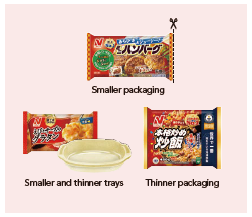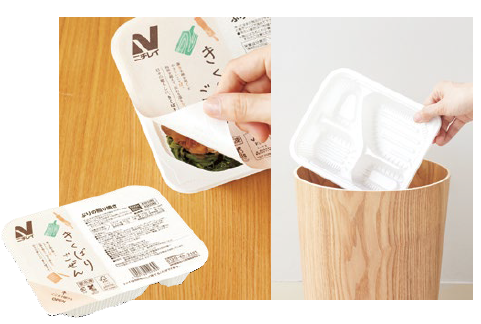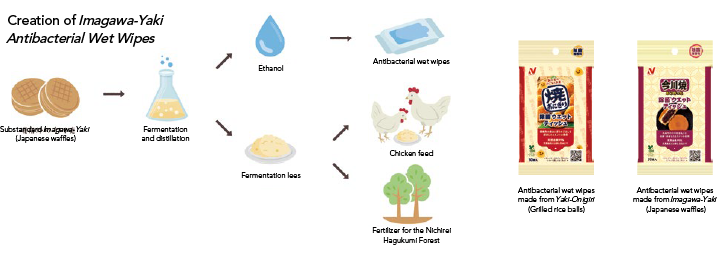The Nichirei Group proposes manufacturing and services that are conscious of minimizing the environmental impact throughout the supply chain.
As a food-related corporate group that is greatly affected by climate change, the Group is working on reducing CO₂ emissions in its products.
We will also work to reduce, reuse, and recycle waste in order to use the limited resources of the Earth as sustainably as possible. For bioresources that the Group is unable to use efficiently and economically or is unable to use completely, it is focusing on reusing these bounties of nature in animal feed or fertilizer and returning them to nature.
Since FY2007, Nichirei Foods has been reducing the amount of plastic used for household-use frozen food product containers and packaging. Recently we reduced plastic use by over 215 tons for 10 items in a product series, compared with usage prior to these initiatives. While continuing to reduce plastic use by reviewing product containers and packaging, we will also work toward reducing our CO₂ emissions.


| Fiscal year | Products | Measures |
|---|---|---|
| FY2007 | Imagawa-Yaki (Japanese waffles) | Elimination of trays |
| FY2010 | Yaki-Onigiri (grilled rice balls) 10-pack | Elimination of trays |
| FY2012 | Honkaku-Itame-Chahan (fried rice) | Thinner packaging |
| FY2015 | Yaki-Onigiri (grilled rice balls) 10-pack | Thinner packaging |
| FY2016 | Honkaku-Itame-Chahan (fried rice) | Thinner packaging (second reduction) |
| FY2019 | Ebi-Pilaf (shrimp pilaf) and Chicken Rice | Thinner packaging |
| FY2021 | Ebi-to-Cheese-no-Gratin (shrimp gratin) and Ebi-to-Cheese-no-Doria (shrimp rice gratin) | Thinner trays, reduced tray handle width |
| FY2022 | Yaki-Onigiri (grilled rice balls) | Elimination of trays for entire lineup |
| FY2024 | Cho-Menchi-Katsu (minced meat cutlet) Kikubari-Gozen (dietary-conscious meals) (selected items) |
Reduced plastic use by switching tray material to STONE-SHEET®, which incorporates calcium carbonate |
| FY2025 | Kikubari-Gozen (dietary-conscious meals) |
|
Nichirei Foods has worked to reduce food loss by making donations to children’s cafeterias and food banks. We also make use of the food residue generated during the production process by recycling it into fertilizer and feed. As a company that deals with food, however, we also want to add “social value” to food residue by upcycling it as part of our efforts to create a more abundant society.
As one of the upcycling initiatives, we have collaborated with Fermenstation Co., Ltd., a company that uses proprietary fermentation technology to upcycle non-standard products and by-products generated during the food and beverage manufacturing processes, as well as agricultural non-standard products. We provide antibacterial wet wipes made by fermenting a portion of substandard products from our long-selling Yaki-Onigiri (grilled rice balls) 10-pack and Imagawa-Yaki (Japanese waffles) to make distilled ethanol.
